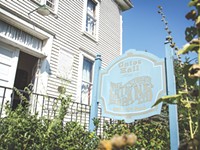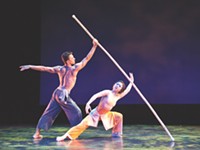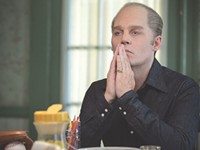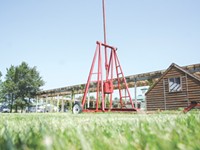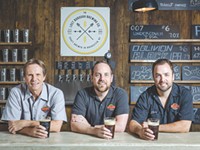If the 2015-16 concert season in Rochester is about one thing, it's audience engagement. And as a result, local concertgoers will have ample opportunity to experience music and guest performers it rarely hears. What is most encouraging about this approach to classical music programming is that it's coming largely from the two most prominent institutions in the city: the Rochester Philharmonic Orchestra and the Eastman School of Music.
These organizations are distinctly positioned to set the tone of future conversations – away from status quo programming that caters exclusively to familiar demographics and toward innovative concert selections that engage new audiences while injecting new compositions alongside standard repertoire. Classical music and opera will only endure insofar as presenters actively select programming that engages younger generations.
When it comes to reaching out to music fans beyond the scope of typical classical music fare, the Rochester Philharmonic Orchestra is at the forefront this year. After kicking off the Ward Stare era in style on September 17 and 19 with a program that includes Paul Dukas's "The Sorcerer's Apprentice" and Samuel Barber's "Adagio for Strings" – two iconic works that aren't performed often enough – the RPO will be looking to embrace a broader audience in a big way when it presents "Distant Worlds: Music from Final Fantasy" on October 29. Building off of the success of its "Video Games Live" concert last November, the RPO will focus solely on the music of the game franchise's composer Nobuo Uematsu in a presentation that will also include exclusive HD video content produced by Final Fantasy developers Square Enix.
The RPO furthers its journey into populist territory on December 12 when the orchestra looks past Tchaikovsky's ballet "The Nutcracker" to present a more contemporary holiday tradition. Many of us already watch the 1990's classic movie "Home Alone" every Christmas, so why not enjoy it on the "big screen" while the RPO plays the score live to accompany the film?
The orchestra's second half of the season features top-flight guest artists both new and familiar. On January 14 and 16, Orchestre Symphonique de Québec Music Director Fabien Gabel returns for the third year in row, this time to conduct Johannes Brahms's "Double Concerto" featuring violinist Karen Gomyo and cellist Julie Albers. April 14 and 16 marks the highly-anticipated RPO debut of acclaimed pianist Yuja Wang, in what is sure to be an electrifying performance of Béla Bartók's "Piano Concerto No. 1," led by Ward Stare.
For concerts in a more intimate chamber music setting, your options range from the medieval to the modern. Pegasus Early Music will start its 11th season on September 27 at Downtown United Presbyterian Church with "French Café," a program of love songs and troubadour tunes sung by countertenor José Lemos and performed on period instruments such as the vielle and rebec, medieval and Renaissance-era fiddles, respectively. The Society for Chamber Music in Rochester will present its own francocentric concert on November 20 at Hochstein Performance Hall in a veritable "who's who" of French composers –Gabriel Fauré, Claude Debussy, Maurice Ravel, Erik Satie, Francis Poulenc, and more – as interpreted by multiple RPO principal musicians.
On the other end of the spectrum, on December 4 at Kilbourn Hall, Eastman School of Music's student-run ensemble Ossia will perform works written exclusively by living composers: Jo Kondo of Japan; Anna Thorvaldsdottir from Iceland; Hans Abrahamson of Denmark; and Mexican-born, Rochester-based Carlos Sanchez-Gutierrez. With two world premieres on the program and four additional works you will probably never hear anywhere else in Rochester, this concert is the epitome of contemporary classical cool.
In what for me is the highlight of the entire season, the ever-consistent Eastman Opera Theatre will present the seldom-performed Philip Glass chamber opera "Hydrogen Jukebox" from November 5 through 8 at Kilbourn Hall. With a libretto culled from existing works by singular Beat poet Allen Ginsberg, "Hydrogen Jukebox" addresses a wide range of sociopolitical issues in America spanning the '50s through the '80s – from war and the environment to drugs and the sexual revolution – as voiced by a cheerleader, priest, policewoman, businessman, waitress, and mechanic.
While a common criticism of Glass's iconic minimalism is that its repetition is tedious, there is more than enough variety in the instrumentation of this 1990 opera. Fifty percent mystical solemnity à la the composer's "Glassworks" from 1982 and fifty percent ecstatic exoticism in the vein of Harry Partch's "Delusion of the Fury," "Hydrogen Jukebox" represents the convergence of two of the most influential American artists of the 20th century, and as such, should not be missed.
When the Metropolitan Opera Rising Stars Concert Series comes to Eastman on March 22, the focus in Kilbourn Hall will not be on the work of a singular operatic composer, but instead on a coterie of singers tasked with interpreting opera's classic works. In lieu of making a road trip down to Lincoln Center in New York City, this will be your best opportunity to hear some of the most promising young voices to fill the hall at the Metropolitan Opera.
And then there are the intriguing oddities of the 2015-16 concert season – music that won't fit nicely into predetermined genre categories, marketing campaigns be damned. On October 20, the John Hollenbeck Large Ensemble arrives at Kilbourn Hall, bringing big band music with avant-garde flair. Composer-drummer John Hollenbeck's music is idiosyncratic and intellectually challenging, but not without also being supremely enjoyable. Since Hollenbeck is an Eastman alumnus, this concert is sure to be a highly personal one as well.
Eastman Wind Ensemble's February 26 concert at the Eastman Theatre will be similarly genre-bending, with the incomparable Béla Fleck on the banjo as soloist. Though the official program has yet to be released, expect to hear at least one original Fleck composition in what should be inspiring evening of master musician-meets-classical music's next generation.
If the above-mentioned concerts are any indication, the 2015-16 season signals a turning point for programming in Rochester. The central question facing local classical music organizations moving forward is this: "What kind of audience do we want to attract?"





